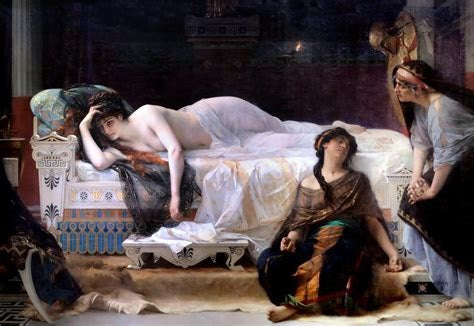Description
Alexandre Cabanel's "Fedra" work, painted in 1880, is located at the Summit of the 19th century academicism, a style that is characterized by its attention to detail, its emphasis on idealized beauty and its reference to mythological and literary issues. In this painting, Cabanel represents Fedra, a character of Greek mythology who, trapped in a forbidden and desperate love, becomes a tragic figure whose intense emotions resonate with the viewer.
The composition of the work focuses on the figure of Fedra, which occupies a prominent position on the canvas. His figure is draped on a tunic of soft tones that unfolds gracefully around him, contrasting with the less defined bottom, allowing the eye to concentrate on the expressiveness of the face and the character's position. Fedra's body line is drawn fluently, generating a sense of movement and vulnerability that suggests both its emotional state and its human nature.
Cabanel uses a carefully selected palette, dominated by warm and soft tones that emphasize the sensuality and fragility of Fedra. Leather nuances are shown with skill, revealing lighting that caresses their figure, creating shadows that provide depth and volume. This attention to light treatment is essential in Cabanel's style, who is inspired by masters of the Renaissance, emphasizing the beauty of the human body through light and shadow.
Fedra's face captures an emotional complexity that transmits his anguish and suffering. The intensity of his gaze, with enigmatic eyes and full of longing, adds a layer of drama to the work. In the expression of his mouth a subtle tension is drawn, perhaps the reflection of his pain. This approach to the internal emotions of the character is a distinctive feature of Cabanel's work, who knew how to evoke a deep emotional connection between the portrait and the spectator.
Although the work may not present an explicit narrative scenario in terms of other characters, their absence allows Fedra's figure to communicate without distractions, causing their history to resonate with greater intensity. This compositional choice highlights the issue of unrequited love and personal tragedy, turning Fedra into a symbol of suffering that often accompanies unfulfilled desires.
Cabanel, known for his portraits and his representations of mythological and literary figures, found in Fedra a muse that embodied the mixture of beauty, desire and tragedy. His work can be related to other representations of Fedra in art and literature, reiterating the fascination that artists have had for this character throughout the centuries. The work is not only appreciated as one of the most refined interpretations of the figure of Fedra, but also as a testimony of the technical domain of Cabanel and its ability to capture the essence of human emotions in the context of classical history.
In summary, "Fedra" is a work that reflects the academic style of Cabanel and its mastery in the representation of the human figure. Through its composition and use of color, paint becomes a powerful visual story. The viewer not only faces a representation of Greek mythology, but also a deep reflection on universal human emotions that transcend time.
KUADROS ©, a famous paint on your wall.
Hand-made oil painting reproductions, with the quality of professional artists and the distinctive seal of KUADROS ©.
Reproduction service paintings With a guarantee of satisfaction. If you are not completely satisfied with the replica of your painting, we refund your money 100%.

